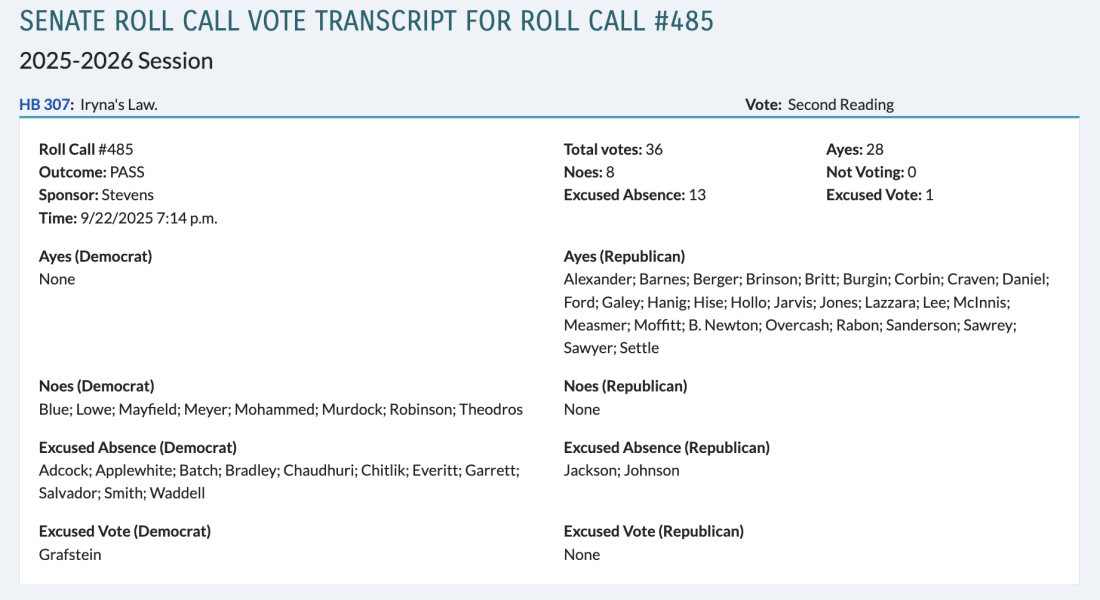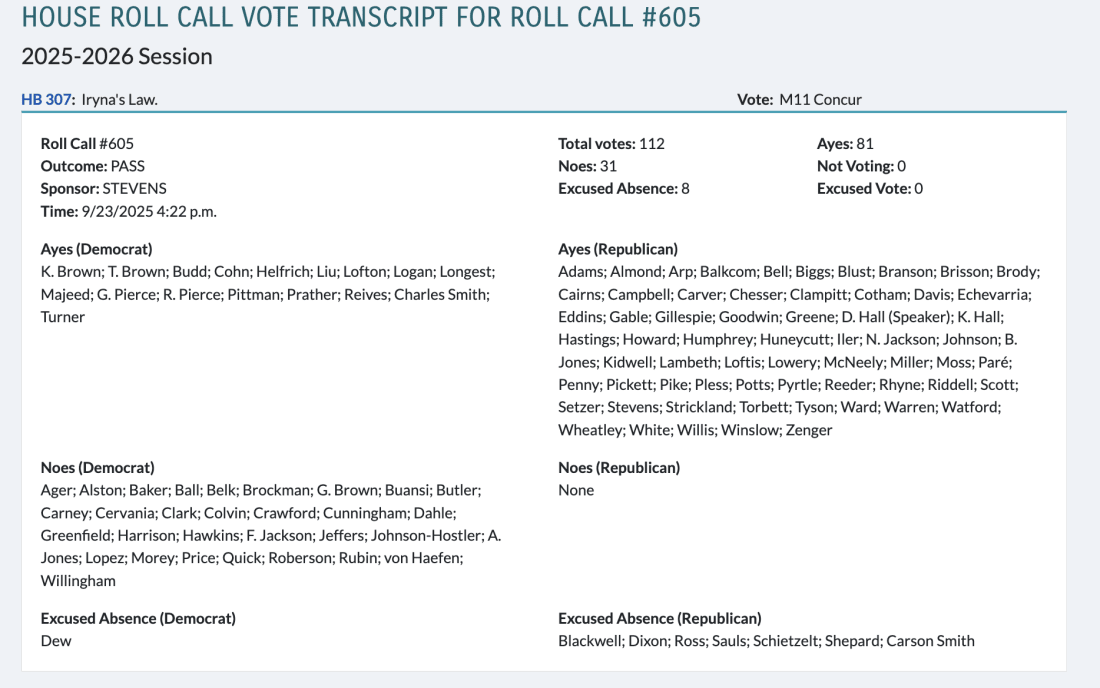|
 |
Republicans Pass Iryna’s Law to Protect Families — Some Democrats Said "No"
Republicans say enough is enough — but many Democrats are still siding with soft-on-crime policies
On Tuesday, the North Carolina General Assembly passed a sweeping new public safety bill aimed at tightening bail rules, restoring the death penalty, and closing loopholes for repeat violent offenders. Known as Iryna’s Law (House Bill 307), the legislation now awaits action from Governor Josh Stein, who must decide whether to veto one of the most high-profile criminal justice reforms in recent state history.
The bill is named after Iryna Zataruska, a 23-year-old Ukrainian refugee who was brutally murdered in Charlotte by a repeat violent offender. Despite a long criminal record, Decalos Brown Jr. was free — a failure, Republicans say, that exposes the dangerous leniency baked into Democratic-run cities.
Key Reforms Under Iryna’s Law
1. Bail Reform for Violent Offenders
The bill removes bail discretion from magistrates in violent cases, requiring suspects to appear before a judge within 48 hours. Republicans argue this change will ensure more serious scrutiny before release.
2. Oversight of Magistrates
For the first time, the Chief Justice of the North Carolina Supreme Court will have the authority to suspend magistrates who mishandle bail decisions. In addition, magistrates will be required to document their bail reasoning on the record.
3. Death Penalty Resumption
Iryna’s Law clears a path for executions to resume in North Carolina. It mandates lethal injection, streamlines appeals, and allows backup execution methods to ensure the sentence can be carried out.
4. Mental Health and Public Safety Provisions
The law broadens the criteria for involuntary mental health commitments and gives District Attorneys greater authority in mental health-related hearings. It also orders a statewide study into the link between untreated mental illness and violent crime.
Together, these reforms represent one of the most comprehensive law-and-order bills enacted in North Carolina in decades.
Why It’s Needed
Iryna Zataruska’s death was an avoidable tragedy, traumatic for every decent American who values life. Sadly, her murder is not an isolated case.
Her murder at the hands of a repeat violent offender exposed a deeper, systemic failure in North Carolina’s largest cities: a justice system run by Democrats that allows dangerous criminals to cycle in and out of custody with barely a pause.
President Trump says Iryna’s murder was a wake-up call — not just for what happened, but for what continues to happen every week across cities like Charlotte.
Iryna isn’t the only victim. In just the past two weeks, Mecklenburg County has seen a flood of cases that show how broken the system has become:
A 22-year-old was arrested for first-degree burglary. He already had 22 prior arrests in just seven years — including assault on a female, strangulation, intent to kill, and cocaine distribution. Under a real “three strikes” system, he’d be in prison. Instead, he’s back out.
Another man was charged with attempted murder. His record? 14 prior arrests over 10+ years across multiple counties. Still walking the streets.
Arrested for robbery and assault with a deadly weapon with intent to kill — after nine arrests this year alone, six of them violent. Why is someone like this still free?
Charged last week with kidnapping and assaulting a woman. He had 18 prior arrests before this latest brutal attack. The signs were all there — and the system did nothing.
The most horrifying of all. A man with a long criminal history, along with three others, went on a violent crime spree that ended with the murder of a 4-year-old child. All four suspects had lengthy arrest records. Yet they were on the street — until it was too late.
These are not rare outliers. They are the natural outcome of a system where jail is optional, bail is a formality, and soft-on-crime prosecutors and judges treat repeat offenders like victims. Lawmakers backing Iryna’s Law say it’s time to end the revolving door, before more lives are lost.
As House Majority Leader Brenden Jones put it:
“You want to talk about kindness and mercy? Where was it for Iryna? Where is it for the 4-year-old who was gunned down? This is lunacy.”
Partisan Divide: Republicans Back Public Safety — Democrats Balk
Despite the bipartisan tragedy that inspired the bill, the vote on Iryna’s Law revealed a deep partisan rift. While Republicans rallied behind the legislation as a long-overdue correction to a justice system that has grown too lenient, Democrats largely stood in opposition — even as the public demands stronger action against violent crime.
In the Senate, the bill passed 28–8, with every Republican voting in favor and every “no” vote coming from Democrats. Thirteen additional Democrats were marked absent, a move some observers see as a quiet protest or strategic avoidance of a politically risky vote.
The House vote was similarly stark, passing 81–31.
Again, Republican lawmakers united behind the bill. Nearly all “no” votes came from Democrats, with only a small handful breaking party ranks to support the reforms.
For many Republicans, the partisan split reflects a fundamental difference in priorities: public safety versus political correctness.
“We’re talking about violent offenders — repeat criminals who’ve had every chance and still choose to harm others,” said one GOP lawmaker. “Our colleagues across the aisle are more worried about appearances than accountability.”
Democrats, on the other hand, raised concerns about incarceration rates, the morality of reviving the death penalty, and potential racial disparities in pretrial detention. But to the bill’s backers, those objections ring hollow — especially in light of tragedies like Iryna Zataruska’s murder.
House Majority Leader Brenden Jones dismissed the pushback as disconnected from real-world consequences:
“Kindness? Mercy? Where was that for Iryna? This monster ended her life — and our colleagues want to argue legal theory? The people of North Carolina want justice, not excuses.”
As violent crime continues to surge in urban centers, Democrats’ resistance to the bill could leave them vulnerable to political blowback.
Their stance sends a dangerous message: that ideology matters more than protecting innocent lives.
What’s Next
The bill now heads to Governor Josh Stein, who must decide whether to align with victims’ families or reject the bill over concerns about judicial discretion and capital punishment.
A veto could reignite public anger over leniency for violent criminals. A veto might hand Republicans a potent issue in upcoming elections.
Regardless of the outcome, one thing is clear: North Carolina has drawn a firm line in the sand. With Iryna’s Law, state lawmakers are signaling a shift away from leniency and toward a justice system built on consequences, not second chances.
You're currently a free subscriber to NC Political Tea. For the full experience, upgrade your subscription.



